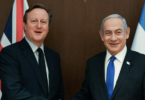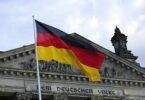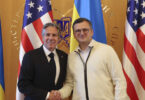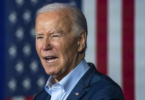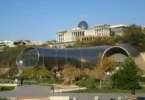Ahmet Gurhan Kartal
LONDON: A new report released by the parliament’s Foreign Relations Committee on Sunday urged the British government to get a “clear view” of the links between the various terrorist organizations operating in Syria.
The evidence to an inquiry, which was collected over a period of three months by the House of Commons’ Foreign Affairs Committee, suggested the YPG “was linked to the PKK”, Tom Tugendhat, the committee chairman, said.
The U.K.’s Foreign and Commonwealth Office (FCO) “should have a clear view of its own” about the connection between the terrorist organizations in Syria, the report titled “Kurdish aspirations and the interests of the U.K.” said.
“In Syria, we need to look past the acronyms to see a serious policy difference between our allies with clear implications for the U.K.,” Tugendhat said.
Underlining that “the YPG is a terrorist organization connected with the PKK” for Turkey, Tugendhat said “for the United States, it [YPG] has been a leading ally against Daesh in Syria and has received weapons from the U.S.”
“Where does the U.K. stand?” he asked.
“The FCO’s view is currently incoherent.
“The evidence to our inquiry argued that this group was linked to the PKK, even though the nature and extent of these links is debatable.
“But the FCO seemed uncertain about whether these links existed at all. That is not credible, and the FCO should have a clear view of its own rather than repeatedly referring to ‘reported’ links.”
– ‘Risk of new fighting’
The 33-page report deals with the independence referendum held last year by Iraq’s Kurdish Regional Administration (KRG) and the YPG/PKK relations in Syria, and points out the “clear risk of new fighting in the Middle East”.
“Those who fought against Daesh shared an enemy, but differed in their vision for what should replace it.
“Now, as Daesh is defeated, past victories risk causing tomorrow’s wars,” the report said.
“The U.K.’s interests are threatened by these conflicts, and examples involving Kurdish groups have already occurred.”
The report also highlighted the clash between the KRG and the central Iraqi government in Baghdad in the wake of the independence referendum held last year, as well as Turkey’s Operation Olive Branch launched in Afrin.
“In Iraq, despite the depth of the differences between the federal government and the Kurds, a negotiated solution is possible. The committee believes … the FCO should formally offer to play an enhanced role in facilitating dialogue,” it said.
However, the report also said, “the FCO had little to say to the committee about signs of corruption or the curtailment of democracy” in KRG.
“It also appeared reluctant to criticize Baghdad over the role of Shia militias connected with Iran.
“The FCO should not shy away from speaking out over these issues,” it added.
The report also underlined that YPG/PKK “now controls more than a quarter of the country [Syria], and this has raised the risk of conflict”.
It also noted that “the YPG’s expansion in northern and eastern Syria was assisted by U.K. military support” during the campaign against Daesh.
The U.K. is aware of the relationship between the terrorist groups, PYD/YPG and the PKK, a top FCO official told the committee last month.
“We are very concerned over possible links. We don’t seek any link with the PKK and ourselves in any way,” Minister of State for the Middle East Alistair Burt said during an evidence-collecting session of the cross-party committee.
Burt was responding to a question by the committee from Labour Party member Mike Gapes on links between the PYD/YPG and the PKK.
“We urge the PYD at all times to sever any links it might have with the PKK,” he added.
In its inquiry, the committee sought answers to various questions regarding the Kurdish and terrorist groups in Iraq and Syria.
Unsatisfied with the response from Foreign Office officials, Gapes said the commission received evidence and written submissions indicating that PKK terrorists had fought alongside other Kurdish groups in various regions.
“It is well known that [convicted PKK terrorist Abdullah] Ocalan’s photograph is displayed at demonstrations and in public places,” he said.
Gapes elaborated his question about the links:
“You must have a view, ultimately, given that our NATO partner and ally Turkey takes a very robust position on this, and given that we designate the PKK as a terrorist organization…and the Turkish government and others deem it a terrorist organization, including witnesses we [the committee] have had say there are very close links between people within the YPG and the PKK.”
In response, Burt said the U.K. “had no contact with the PKK.
“We are aware of links as you are aware of links.
“It [PYD] is a dominant force in the Syrian Democratic Forces. We are not supplying any equipment to those forces. We are not supplying any weapons to those forces.
They get air support because they are engaged in a conflict that we support.
“When we talk to PYD/YPG…we say that they should sever links with the PKK. Now, the practicalities are they probably do not, so the links are there.
We know about that but we have no contact with the PKK, and we do raise it with the PYD all the time.”
He also said the two organizations “clearly have links, but it is a massive situation on the ground”.
He added he “would be astonished if weapons used in the conflict were not passed between respected parties who would be fighting on the same side.
It would be naive to think anything different”.
Gapes also asked about Turkey’s concerns over weapons deployment in the region.
Amy Clemitshaw, another FCO official, said:
“We are aware of Turkey’s concerns. I am not aware of any U.K. weapons being involved.”

